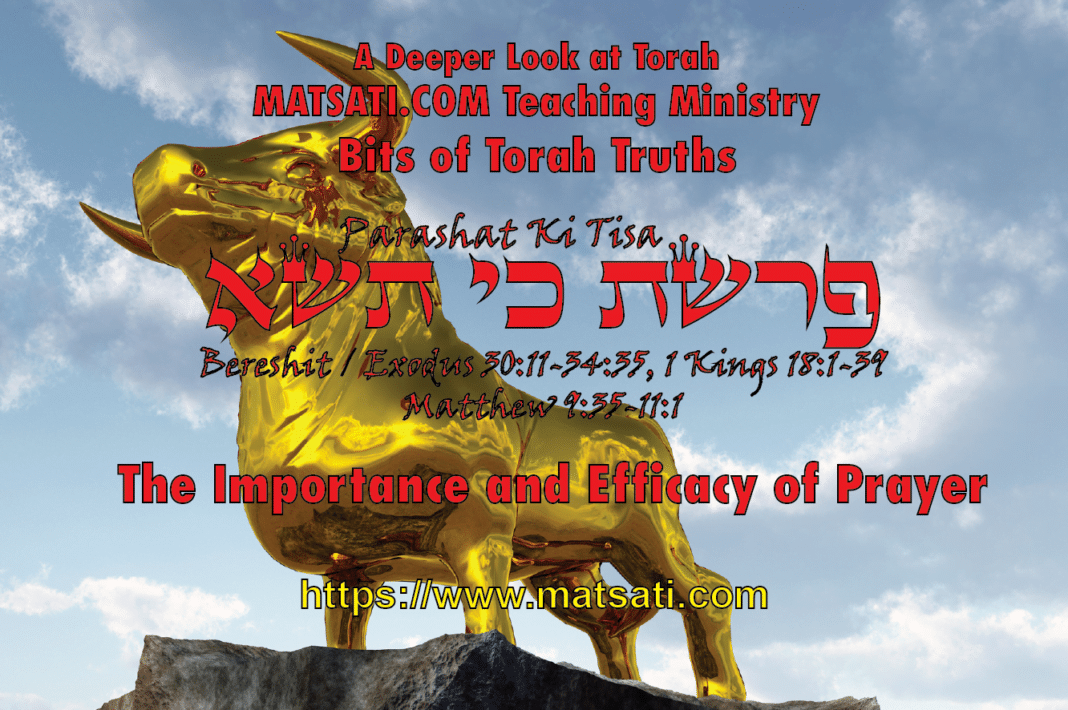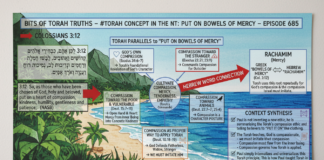In this week’s Torah portion we read about the great sin of Israel at Sinai and the great mercy of God to His people. We read the beginning of this situation according to Shemot / Exodus 32:1, א וַיַּרְא הָעָם כִּי-בֹשֵׁשׁ מֹשֶׁה לָרֶדֶת מִן-הָהָר וַיִּקָּהֵל הָעָם עַל-אַהֲרֹן וַיֹּאמְרוּ אֵלָיו קוּם | עֲשֵֹה-לָנוּ אֱלֹהִים אֲשֶׁר יֵלְכוּ לְפָנֵינוּ כִּי-זֶה | מֹשֶׁה הָאִישׁ אֲשֶׁר הֶעֱלָנוּ מֵאֶרֶץ מִצְרַיִם לֹא יָדַעְנוּ מֶה-הָיָה לוֹ: 32:1 Now when the people saw that Moses delayed to come down from the mountain, the people assembled about Aaron and said to him, ‘Come, make us a god who will go before us; as for this Moses, the man who brought us up from the land of Egypt, we do not know what has become of him.’ (NASB) Is it possible that the people believed they should have heard from God or His משיח sooner and wondered why there was a 40 day delay? Was there a lack of faith as having seen God descend upon the mountain and the mountain burn with fire and smoke? God’s timing is always perfect, and often times it’s not how long we think it should be. In fact, according to 2 Peter 3:8, the Apostle Peter tells us that a thousand years is as a day to the Lord. What these things reveal to us is how most of the time one gives up on waiting on the Lord because one runs out of patience. We have to realize that God always has a plan. In fact, we are told that God has a plan for each and every one of us according to the book of Jeremiah. We read according to the book of Jeremiah an interesting perspective when the Word of the Lord came to Jeremiah according to Jeremiah 1. Here in Jeremiah 1:4-10, the Lord tells Jeremiah that before He formed him in the womb, He knew him. This speaks to the Lord God having a plan for what He wants out of His creation. In the situation of we find in Parashat Ki Tisa, do you think God had a plan for His people by keeping Moshe on the mountain for 40 days? Maybe the Lord was testing their faith?
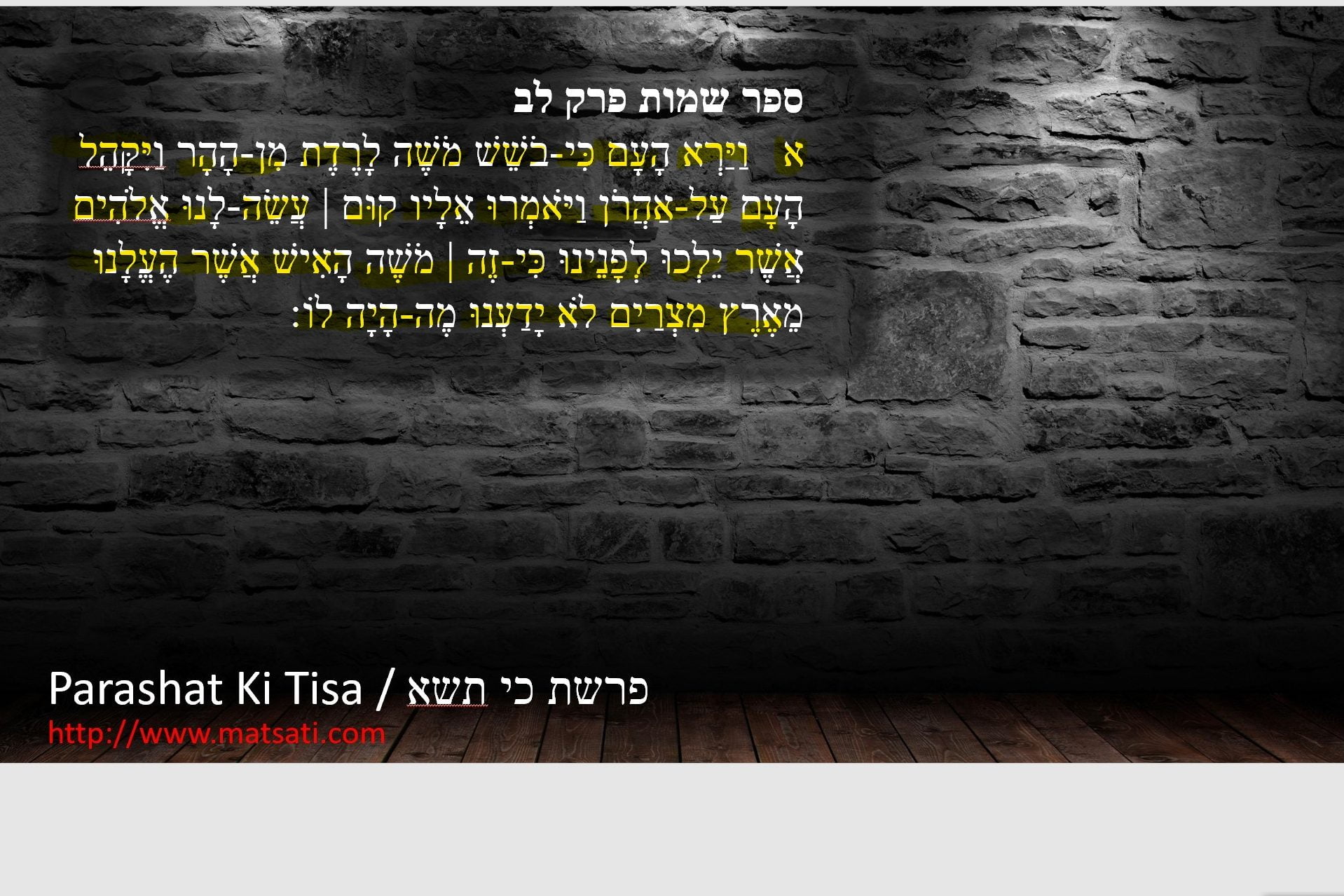
ספר ירמיה פרק א
ד וַיְהִי דְבַר-יְהֹוָה אֵלַי לֵאמֹר: ה בְּטֶרֶם אֶצָּורְךָ [אֶצָּרְךָ] בַבֶּטֶן יְדַעְתִּיךָ וּבְטֶרֶם תֵּצֵא מֵרֶחֶם הִקְדַּשְׁתִּיךָ נָבִיא לַגּוֹיִם נְתַתִּיךָ: ו וָאֹמַר אֲהָהּ אֲדֶֹנָי יְהוִֹה הִנֵּה לֹא-יָדַעְתִּי דַבֵּר כִּי-נַעַר אָנֹכִי: ז וַיֹּאמֶר יְהֹוָה אֵלַי אַל-תֹּאמַר נַעַר אָנֹכִי כִּי עַל-כָּל-אֲשֶׁר אֶשְׁלָחֲךָ תֵּלֵךְ וְאֵת כָּל-אֲשֶׁר אֲצַוְּךָ תְּדַבֵּר: ח אַל-תִּירָא מִפְּנֵיהֶם כִּי-אִתְּךָ אֲנִי לְהַצִּלֶךָ נְאֻם-יְהֹוָה: ט וַיִּשְׁלַח יְהֹוָה אֶת-יָדוֹ וַיַּגַּע עַל-פִּי וַיֹּאמֶר יְהֹוָה אֵלַי הִנֵּה נָתַתִּי דְבָרַי בְּפִיךָ: י רְאֵה הִפְקַדְתִּיךָ | הַיּוֹם הַזֶּה עַל-הַגּוֹיִם וְעַל-הַמַּמְלָכוֹת לִנְתוֹשׁ וְלִנְתוֹץ וּלְהַאֲבִיד וְלַהֲרוֹס לִבְנוֹת וְלִנְטוֹעַ:
Jeremiah 1:4-10
1:4 Now the word of the Lord came to me saying, 1:5 ‘Before I formed you in the womb I knew you, And before you were born I consecrated you; I have appointed you a prophet to the nations.’ 1:6 Then I said, ‘Alas, Lord God! Behold, I do not know how to speak, Because I am a youth.’ 1:7 But the Lord said to me, ‘Do not say, ‘I am a youth,’ Because everywhere I send you, you shall go, And all that I command you, you shall speak. 1:8 ‘Do not be afraid of them, For I am with you to deliver you,’ declares the Lord. 1:9 Then the Lord stretched out His hand and touched my mouth, and the Lord said to me, ‘Behold, I have put My words in your mouth. 1:10 ‘See, I have appointed you this day over the nations and over the kingdoms, To pluck up and to break down, To destroy and to overthrow, To build and to plant.’ (NASB)
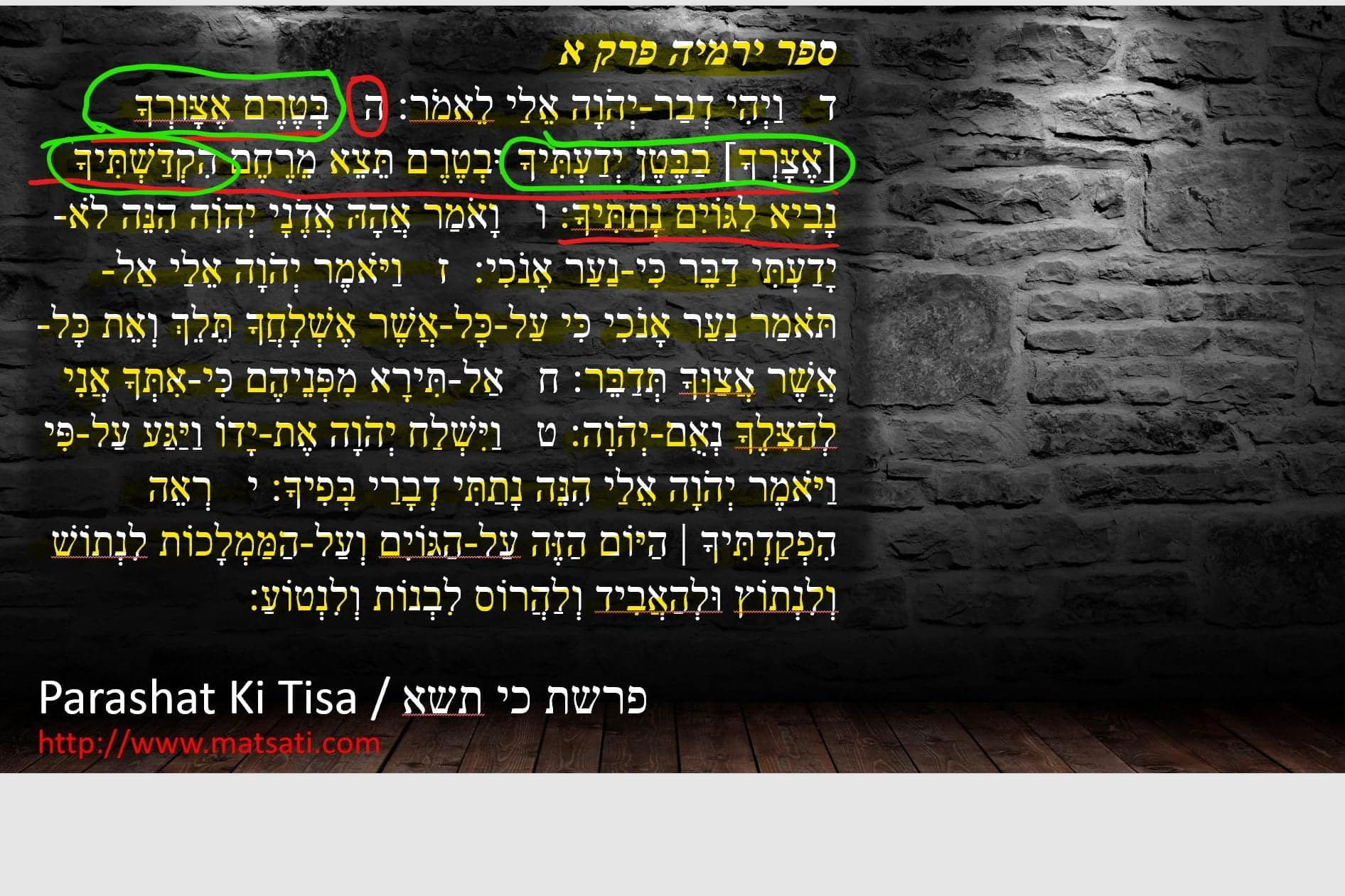
The significant verse is found in Jeremiah 1:5 when the Lord God states that He did not just know Jeremiah before he was formed in the womb, He also had a plan for his life as a prophet. The text states ה בְּטֶרֶם אֶצָּורְךָ [אֶצָּרְךָ] בַבֶּטֶן יְדַעְתִּיךָ וּבְטֶרֶם תֵּצֵא מֵרֶחֶם הִקְדַּשְׁתִּיךָ נָבִיא לַגּוֹיִם נְתַתִּיךָ: Let’s break this verse down a little further. This portion of the verse is the most often quoted, בְּטֶרֶם אֶצָּורְךָ [אֶצָּרְךָ] בַבֶּטֶן יְדַעְתִּיךָ “before I formed you in the belly, I knew you.” The less often quoted portion of the verse is what follows, וּבְטֶרֶם תֵּצֵא מֵרֶחֶם הִקְדַּשְׁתִּיךָ נָבִיא לַגּוֹיִם נְתַתִּיךָ “before you came out from the womb, I sanctified you as a prophet to the nations” We notice how the Lord God speaks of sanctifying the life of Jeremiah to be a prophet. This word הִקְדַּשְׁתִּיךָ is derived from the root קדש which means to make holy, to set apart for the service of God, and in this instance to be a prophet. Here the Lord is revealing to Jeremiah His plan. Do these things speak to God knowing all things? He knows who we are, who we will be, what we want, and what are needs are. As we continue to read the book of Jeremiah, we read the Lord repeating something similar to nation of Israel as having a plan for their lives according to Jeremiah 29:11.
ספר ירמיה פרק כט
יא כִּי אָנֹכִי יָדַעְתִּי אֶת-הַמַּחֲשָׁבֹת אֲשֶׁר אָנֹכִי חשֵׁב עֲלֵיכֶם נְאֻם-יְהֹוָה מַחְשְׁבוֹת שָׁלוֹם וְלֹא לְרָעָה לָתֵת לָכֶם אַחֲרִית וְתִקְוָה: יב וּקְרָאתֶם אֹתִי וַהֲלַכְתֶּם וְהִתְפַּלַּלְתֶּם אֵלָי וְשָׁמַעְתִּי אֲלֵיכֶם: יג וּבִקַּשְׁתֶּם אֹתִי וּמְצָאתֶם כִּי תִדְרְשֻׁנִי בְּכָל-לְבַבְכֶם: יד וְנִמְצֵאתִי לָכֶם נְאֻם-יְהֹוָה וְשַׁבְתִּי אֶת-שְׁביּתְכֶם [שְׁבוּתְכֶם] וְקִבַּצְתִּי אֶתְכֶם מִכָּל-הַגּוֹיִם וּמִכָּל-הַמְּקוֹמוֹת אֲשֶׁר הִדַּחְתִּי אֶתְכֶם שָׁם נְאֻם-יְהֹוָה וַהֲשִׁבֹתִי אֶתְכֶם אֶל-הַמָּקוֹם אֲשֶׁר-הִגְלֵיתִי אֶתְכֶם מִשָּׁם:
Jeremiah 29:11-14
29:11 ‘For I know the plans that I have for you,’ declares the Lord, ‘plans for welfare and not for calamity to give you a future and a hope. 29:12 ‘Then you will call upon Me and come and pray to Me, and I will listen to you. 29:13 ‘You will seek Me and find Me when you search for Me with all your heart. 29:14 ‘I will be found by you,’ declares the Lord, ‘and I will restore your fortunes and will gather you from all the nations and from all the places where I have driven you,’ declares the Lord, ‘and I will bring you back to the place from where I sent you into exile.’ (NASB)
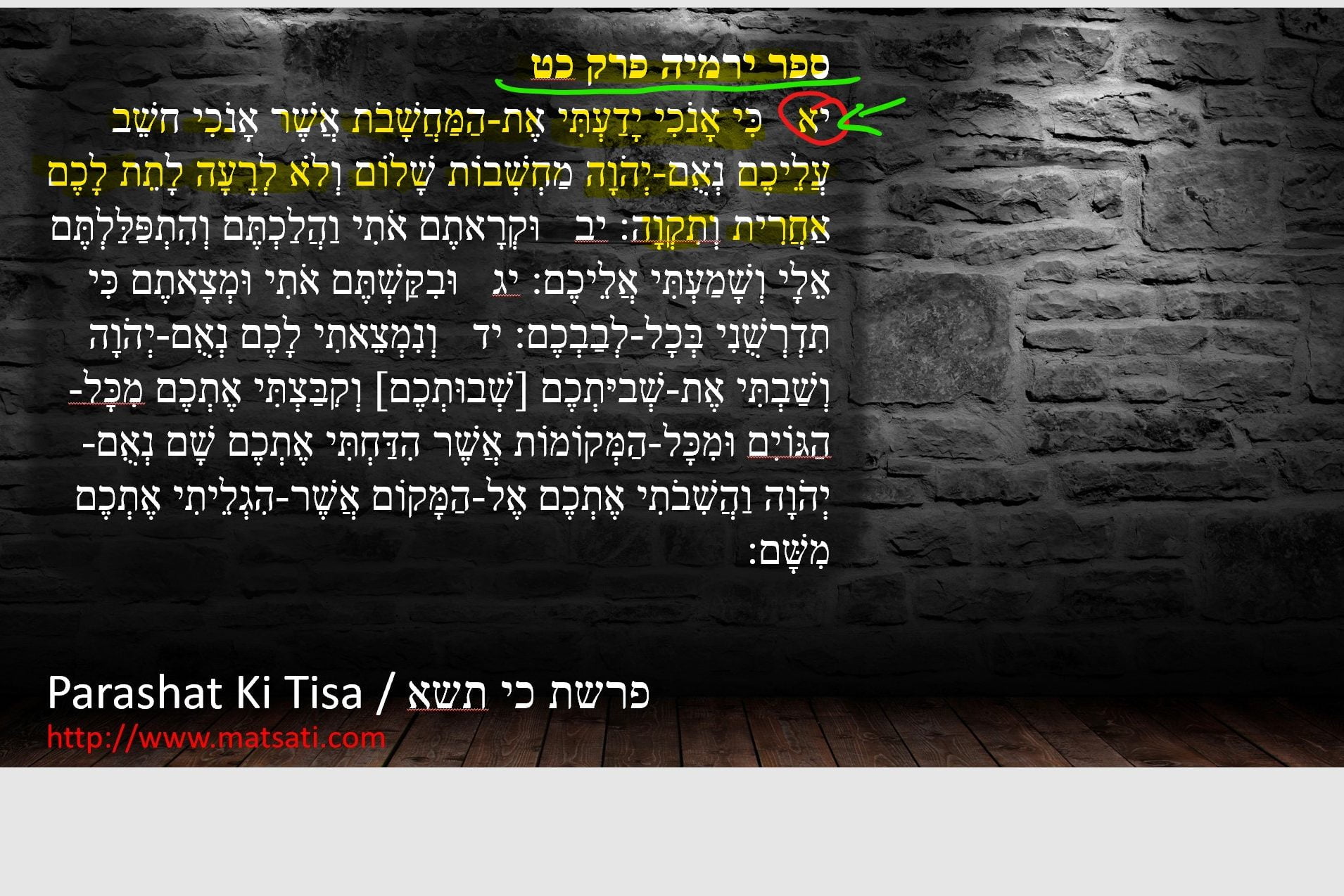
Here the specific verse we are interested in is from Jeremiah 29:11, which states, יא כִּי אָנֹכִי יָדַעְתִּי אֶת-הַמַּחֲשָׁבֹת אֲשֶׁר אָנֹכִי חשֵׁב עֲלֵיכֶם נְאֻם-יְהֹוָה מַחְשְׁבוֹת שָׁלוֹם וְלֹא לְרָעָה לָתֵת לָכֶם אַחֲרִית וְתִקְוָה: “For I know the plans (אֶת-הַמַּחֲשָׁבֹת) that I have for you,’ declares the Lord (אָנֹכִי חשֵׁב עֲלֵיכֶם נְאֻם-יְהֹוָה), ‘plans for welfare (שָׁלוֹם , peace) and not for calamity (וְלֹא לְרָעָה, and not evil) to give you a future (אַחֲרִית) and a hope (וְתִקְוָה).” We note how this reveals to us how God also has a plan and vision for the future of His people, for those who are called the children of God! We see here in God’s words to the people of Israel, these are not just words to Jeremiah, they are for a nation of people. These verses are actually very significant and are related to prayer and this week’s Torah Portion. So when we read these verses, the questions one might ask are, “If God already has a plan for me, why should I pray?” and “If He already knows what I want, why should I tell Him?” When we consider the verses that speak of God having a foreknowledge as knowing us before we were created, this suggests that God knows who we are and what we were capable of, and what we will become. The all knowing God also understands our circumstances and the events that are occurring in our lives. He knows what we want and what we need and as Jeremiah states, “For I know the plans (אֶת-הַמַּחֲשָׁבֹת) that I have for you,’ declares the Lord (אָנֹכִי חשֵׁב עֲלֵיכֶם נְאֻם-יְהֹוָה), ‘plans for welfare (שָׁלוֹם , peace) and not for calamity (וְלֹא לְרָעָה, and not evil) to give you a future (אַחֲרִית) and a hope (וְתִקְוָה).” These things coupled to this week’s Torah portion reveal to us that God has a plan for our lives, and He knows best how to accomplish His plan for our lives.
The Scriptures we are looking at for this week’s Torah Portion are from Shemot / Exodus 32:1-15.
ספר שמות פרק לב
א וַיַּרְא הָעָם כִּי-בֹשֵׁשׁ מֹשֶׁה לָרֶדֶת מִן-הָהָר וַיִּקָּהֵל הָעָם עַל-אַהֲרֹן וַיֹּאמְרוּ אֵלָיו קוּם | עֲשֵֹה-לָנוּ אֱלֹהִים אֲשֶׁר יֵלְכוּ לְפָנֵינוּ כִּי-זֶה | מֹשֶׁה הָאִישׁ אֲשֶׁר הֶעֱלָנוּ מֵאֶרֶץ מִצְרַיִם לֹא יָדַעְנוּ מֶה-הָיָה לוֹ: ב וַיֹּאמֶר אֲלֵהֶם אַהֲרֹן פָּרְקוּ נִזְמֵי הַזָּהָב אֲשֶׁר בְּאָזְנֵי נְשֵׁיכֶם בְּנֵיכֶם וּבְנֹתֵיכֶם וְהָבִיאוּ אֵלָי: ג וַיִּתְפָּרְקוּ כָּל-הָעָם אֶת-נִזְמֵי הַזָּהָב אֲשֶׁר בְּאָזְנֵיהֶם וַיָּבִיאוּ אֶל-אַהֲרֹן: ד וַיִּקַּח מִיָּדָם וַיָּצַר אֹתוֹ בַּחֶרֶט וַיַּעֲשֵֹהוּ עֵגֶל מַסֵּכָה וַיֹּאמְרוּ אֵלֶּה אֱלֹהֶיךָ יִשְֹרָאֵל אֲשֶׁר הֶעֱלוּךָ מֵאֶרֶץ מִצְרָיִם: ה וַיַּרְא אַהֲרֹן וַיִּבֶן מִזְבֵּחַ לְפָנָיו וַיִּקְרָא אַהֲרֹן וַיֹּאמַר חַג לַיהוָֹה מָחָר: ו וַיַּשְׁכִּימוּ מִמָּחֳרָת וַיַּעֲלוּ עֹלֹת וַיַּגִּשׁוּ שְׁלָמִים וַיֵּשֶׁב הָעָם לֶאֱכֹל וְשָׁתוֹ וַיָּקֻמוּ לְצַחֵק: פ ז וַיְדַבֵּר יְהֹוָה אֶל-מֹשֶׁה לֶךְ-רֵד כִּי שִׁחֵת עַמְּךָ אֲשֶׁר הֶעֱלֵיתָ מֵאֶרֶץ מִצְרָיִם: ח סָרוּ מַהֵר מִן-הַדֶּרֶךְ אֲשֶׁר צִוִּיתִם עָשֹוּ לָהֶם עֵגֶל מַסֵּכָה וַיִּשְׁתַּחֲווּ-לוֹ וַיִּזְבְּחוּ-לוֹ וַיֹּאמְרוּ אֵלֶּה אֱלֹהֶיךָ יִשְֹרָאֵל אֲשֶׁר הֶעֱלוּךָ מֵאֶרֶץ מִצְרָיִם: ט וַיֹּאמֶר יְהֹוָה אֶל-מֹשֶׁה רָאִיתִי אֶת-הָעָם הַזֶּה וְהִנֵּה עַם-קְשֵׁה-עֹרֶף הוּא: י וְעַתָּה הַנִּיחָה לִּי וְיִחַר-אַפִּי בָהֶם וַאֲכַלֵּם וְאֶעֱשֶֹה אוֹתְךָ לְגוֹי גָּדוֹל: יא וַיְחַל מֹשֶׁה אֶת-פְּנֵי יְהוָֹה אֱלֹהָיו וַיֹּאמֶר לָמָה יְהוָֹה יֶחֱרֶה אַפְּךָ בְּעַמֶּךָ אֲשֶׁר הוֹצֵאתָ מֵאֶרֶץ מִצְרַיִם בְּכֹחַ גָּדוֹל וּבְיָד חֲזָקָה: יב לָמָּה יֹאמְרוּ מִצְרַיִם לֵאמֹר בְּרָעָה הוֹצִיאָם לַהֲרֹג אֹתָם בֶּהָרִים וּלְכַלֹּתָם מֵעַל פְּנֵי הָאֲדָמָה שׁוּב מֵחֲרוֹן אַפֶּךָ וְהִנָּחֵם עַל-הָרָעָה לְעַמֶּךָ: יג זְכֹר לְאַבְרָהָם לְיִצְחָק וּלְיִשְֹרָאֵל עֲבָדֶיךָ אֲשֶׁר נִשְׁבַּעְתָּ לָהֶם בָּךְ וַתְּדַבֵּר אֲלֵהֶם אַרְבֶּה אֶת-זַרְעֲכֶם כְּכוֹכְבֵי הַשָּׁמָיִם וְכָל-הָאָרֶץ הַזֹּאת אֲשֶׁר אָמַרְתִּי אֶתֵּן לְזַרְעֲכֶם וְנָחֲלוּ לְעֹלָם: יד וַיִּנָּחֶם יְהוָֹה עַל-הָרָעָה אֲשֶׁר דִּבֶּר לַעֲשֹוֹת לְעַמּוֹ: פ טו וַיִּפֶן וַיֵּרֶד מֹשֶׁה מִן-הָהָר וּשְׁנֵי לֻחֹת הָעֵדֻת בְּיָדוֹ לֻחֹת כְּתֻבִים מִשְּׁנֵי עֶבְרֵיהֶם מִזֶּה וּמִזֶּה הֵם כְּתֻבִים:
Shemot / Exodus 32:1-15
32:1 Now when the people saw that Moses delayed to come down from the mountain, the people assembled about Aaron and said to him, ‘Come, make us a god who will go before us; as for this Moses, the man who brought us up from the land of Egypt, we do not know what has become of him.’ 32:2 Aaron said to them, ‘Tear off the gold rings which are in the ears of your wives, your sons, and your daughters, and bring them to me.’ 32:3 Then all the people tore off the gold rings which were in their ears and brought them to Aaron. 32:4 He took this from their hand, and fashioned it with a graving tool and made it into a molten calf; and they said, ‘This is your god, O Israel, who brought you up from the land of Egypt.’ 32:5 Now when Aaron saw this, he built an altar before it; and Aaron made a proclamation and said, ‘Tomorrow shall be a feast to the Lord.’ 32:6 So the next day they rose early and offered burnt offerings, and brought peace offerings; and the people sat down to eat and to drink, and rose up to play. 32:7 Then the Lord spoke to Moses, ‘Go down at once, for your people, whom you brought up from the land of Egypt, have corrupted themselves. 32:8 ‘They have quickly turned aside from the way which I commanded them. They have made for themselves a molten calf, and have worshiped it and have sacrificed to it and said, ‘This is your god, O Israel, who brought you up from the land of Egypt!’‘ 32:9 The Lord said to Moses, ‘I have seen this people, and behold, they are an obstinate people. 32:10 ‘Now then let Me alone, that My anger may burn against them and that I may destroy them; and I will make of you a great nation.’ 32:11 Then Moses entreated the Lord his God, and said, ‘O Lord, why does Your anger burn against Your people whom You have brought out from the land of Egypt with great power and with a mighty hand? 32:12 ‘Why should the Egyptians speak, saying, ‘With evil intent He brought them out to kill them in the mountains and to destroy them from the face of the earth’? Turn from Your burning anger and change Your mind about doing harm to Your people. 32:13 ‘Remember Abraham, Isaac, and Israel, Your servants to whom You swore by Yourself, and said to them, ‘I will multiply your descendants as the stars of the heavens, and all this land of which I have spoken I will give to your descendants, and they shall inherit it forever.’‘ 32:14 So the Lord changed His mind about the harm which He said He would do to His people. 32:15 Then Moses turned and went down from the mountain with the two tablets of the testimony in his hand, tablets which were written on both sides; they were written on one side and the other. (NASB)
We also read the following according to the Torah from Shemot / Exodus 32:9-10, ט וַיֹּאמֶר יְהֹוָה אֶל-מֹשֶׁה רָאִיתִי אֶת-הָעָם הַזֶּה וְהִנֵּה עַם-קְשֵׁה-עֹרֶף הוּא: י וְעַתָּה הַנִּיחָה לִּי וְיִחַר-אַפִּי בָהֶם וַאֲכַלֵּם וְאֶעֱשֶֹה אוֹתְךָ לְגוֹי גָּדוֹל: 32:9 The Lord said to Moses, ‘I have seen this people, and behold, they are an obstinate people. 32:10 ‘Now then let Me alone, that My anger may burn against them and that I may destroy them; and I will make of you a great nation.’ (NASB) Is this the kind of relationship that man had with God according to the Tanakh where one is destroyed if he/she angers God? Is the prohibition to not commit idolatry a salvific work? The modern theologies today would have us believe this is true, as this is the outcome of the doctrine of Dispensationalism. The Scriptures however speak otherwise! We note how God has a plan, This is what we learn in this week’s Torah portion. God has a plan for the nation of Israel, the children of Abraham, Isaac, and Jacob. However, due to their wanting other gods (אֱלֹהִים אֲחֵרִים) the Lord changed His plan for these specific people. We note how Moshe interceded on behalf of the people as the text states in Shemot / Exodus 32:11-14, יא וַיְחַל מֹשֶׁה אֶת-פְּנֵי יְהוָֹה אֱלֹהָיו וַיֹּאמֶר לָמָה יְהוָֹה יֶחֱרֶה אַפְּךָ בְּעַמֶּךָ אֲשֶׁר הוֹצֵאתָ מֵאֶרֶץ מִצְרַיִם בְּכֹחַ גָּדוֹל וּבְיָד חֲזָקָה: יב לָמָּה יֹאמְרוּ מִצְרַיִם לֵאמֹר בְּרָעָה הוֹצִיאָם לַהֲרֹג אֹתָם בֶּהָרִים וּלְכַלֹּתָם מֵעַל פְּנֵי הָאֲדָמָה שׁוּב מֵחֲרוֹן אַפֶּךָ וְהִנָּחֵם עַל-הָרָעָה לְעַמֶּךָ: יג זְכֹר לְאַבְרָהָם לְיִצְחָק וּלְיִשְֹרָאֵל עֲבָדֶיךָ אֲשֶׁר נִשְׁבַּעְתָּ לָהֶם בָּךְ וַתְּדַבֵּר אֲלֵהֶם אַרְבֶּה אֶת-זַרְעֲכֶם כְּכוֹכְבֵי הַשָּׁמָיִם וְכָל-הָאָרֶץ הַזֹּאת אֲשֶׁר אָמַרְתִּי אֶתֵּן לְזַרְעֲכֶם וְנָחֲלוּ לְעֹלָם: יד וַיִּנָּחֶם יְהוָֹה עַל-הָרָעָה אֲשֶׁר דִּבֶּר לַעֲשֹוֹת לְעַמּוֹ: 32:11 Then Moses entreated the Lord his God, and said, ‘O Lord, why does Your anger burn against Your people whom You have brought out from the land of Egypt with great power and with a mighty hand? 32:12 ‘Why should the Egyptians speak, saying, ‘With evil intent He brought them out to kill them in the mountains and to destroy them from the face of the earth’? Turn from Your burning anger and change Your mind about doing harm to Your people. 32:13 ‘Remember Abraham, Isaac, and Israel, Your servants to whom You swore by Yourself, and said to them, ‘I will multiply your descendants as the stars of the heavens, and all this land of which I have spoken I will give to your descendants, and they shall inherit it forever.’‘ 32:14 So the Lord changed His mind about the harm which He said He would do to His people. (NASB) Here we see how Moshe interceding on behalf of the people, and the Lord God changed His mind as the text states. This answers our question on whether we should pray asking God for anything, i.e. “why should we pray with requests to God?” So does this mean God has everything and every detail worked out in our lives? Or does this suggest our lives and relationship with God are more dynamic and fluid? This is a very important observation, and illustrates why studying Torah is so important for our lives today, especially for understanding these things and getting answers for these questions! By studying the Torah we learn something about God and His creation. We learn that God’s plan for our lives is more “fluid” or “dynamic” than we realized. Note also understanding these things requires one to have read the Scriptures many times year after year. My best advice based upon my own experience is to begin studying the Hebrew language as this causes one to become very critical on what exactly the text is saying as we translate what is said into English in our heads! Concerning the plan of God for our lives, we read the following according to Bereshit / Genesis 12:1-3, א וַיֹּאמֶר יְהוָֹה אֶל-אַבְרָם לֶךְ-לְךָ מֵאַרְצְךָ וּמִמּוֹלַדְתְּךָ וּמִבֵּית אָבִיךָ אֶל-הָאָרֶץ אֲשֶׁר אַרְאֶךָּ: ב וְאֶעֶשְֹךָ לְגוֹי גָּדוֹל וַאֲבָרֶכְךָ וַאֲגַדְּלָה שְׁמֶךָ וֶהְיֵה בְּרָכָה: ג וַאֲבָרְכָה מְבָרֲכֶיךָ וּמְקַלֶּלְךָ אָאֹר וְנִבְרְכוּ בְךָ כֹּל מִשְׁפְּחֹת הָאֲדָמָה: 12:1 Now the Lord said to Abram, ‘Go forth from your country, And from your relatives And from your father’s house, To the land which I will show you; 12:2 And I will make you a great nation, And I will bless you, And make your name great; And so you shall be a blessing; 12:3 And I will bless those who bless you, And the one who curses you I will curse. And in you all the families of the earth will be blessed.’ (NASB) Here we are told that God promised Abraham that His descendants would become a great nation. Note how this is the plan of God to do for Abraham! The Lord God also promised that this great nation would come through Isaac and Jacob too. (Bereshit / Genesis 28:13-15) Then we read how the nation of Israel grew to great numbers while in servitude to Egypt. The Lord God delivered His people from Bondage, destroyed the Egyptian Army, and brought His people to the Mountain of Sinai. It is here in Parashat Ki Tisa that we read how Moshe went up the mountain, and while he was upon the mountain, the people made for themselves a golden calf. It was this particular point in time in which the Lord God informed Moshe of what He was about to do to Israel because of her sin. (see Shemot / Exodus 32:10-12) The idea here in the pages of the Torah speaks to how the Lord God was going to destroy Israel and start over with Moshe making him into a great nation. This seems contradictory to His plan that He had for the nation as having promised Abraham his descendants would be vast and numerous. The question is that if God had destroyed Israel and made Moshe into a great nation, would this contradict what God had promised to Abraham? No, since Moshe was also a descendant of Abraham and so making Him a great nation would NOT lead to a contradiction in terms. The point here is, God’s plan remained intact! This speaks to why it is important for us to pray and seek the Lord for our requests. Just as we see here how Moshe was able to dissuade God from destroying the people. We note that in this case, God told Moshe directly what He was going to do to the people. In our own lives, we do not know exactly what God is going to do! Moshe prayed and persuaded God to not destroy Israel, and he did this through prayer! Notice how God’s plan was in place, yet Moshe praying in supplication and intercession on behalf of Israel changed the path by which the plan proceeded. Destroying the nation due to her sins was God’s plan, and then Moshe interceded to change the outcome of their sin. (Note, this is how Yeshua functions in our lives as our intercessor and savior, a prophet like Moshe, Right?) In these Scriptures, Moshe argues with God to not kill the people. (Shemot / Exodus 32:10-13, וְעַתָּה הַנִּיחָה לִּי וְיִחַר-אַפִּי בָהֶם וַאֲכַלֵּם וְאֶעֱשֶֹה אוֹתְךָ לְגוֹי גָּדוֹל) and the Lord God relents to what he had determined to do. The Torah is revealing to us why prayer and supplication (making requests) are so important! There are other examples from the Torah, such as God having knowledge of what was to happen in the Garden of Eden, yet He asked where Adam and Eve were in Bereshit / Genesis 3:9. Take another example on the Lord telling Abraham to sacrifice his only son Isaac (Bereshit / Genesis 22). The point of these narratives are to show us that prayer is not ineffectual when God knows all or when He has a plan. We are not always told the details, but can you imagine how Abraham was praying while making his trip to Mount Moriah to sacrifice his only son? The point of revealing these things to Moshe may have been for the Lord to understand how Moshe understood these things. In Parashat Ki Tisa, the Lord was seeing what Moshe thought and how he would respond to God’s plan. Note how the Torah also reveals to us that God does not control our thoughts. He wants to hear our thoughts, our wants, and our desires. We notice how Moshe through his prayer did not change God’s plan for the nation of Israel as He promised to Abraham. Either way God’s plan would have been fulfilled! It was however through prayer and supplication that led to exactly how that plan God had was fulfilled! This is a significant point the Scriptures are teaching us! It is in this way that as we pray, our thoughts, our feelings, our supplication (requests), and our submission to God’s Word, we are showing to whom we belong, taking our stand with the Lord by seeking His help. It is by our prayer requests that we find ourselves seeking God in heaven to help us to live our lives for His glory. The Torah reveals to us how the Lord God is looking for our interactive participation with His plan through prayer. These things reveal also how our relationship with God and His Messiah Yeshua are very important and yet very fluid / dynamic! David wrote almost half of the psalms and many of which were for the purpose of asking the Lord to meet his struggles and desires with hope, success, and salvation. This is why David is called a man after God’s own heart. Our relationship with God is not a passive one, but an active one as we seek His will. So when we look at our own situation, we can know that God is going to carry out His will in our lives no matter what. Our prayers however may be effectual to shape and mold how God works out His plan, how the Lord works out the necessary steps to get there. This is what Paul meant when he said “work out your salvation with fear and trembling” according to Philippians 2:12. When we do this, we also must be aware that the Lord God may have a different idea than we have in our mind’s on how things will work out. We can live however with confidence, that no matter how our lives play out, the Lord will sustain us and take care of us!
